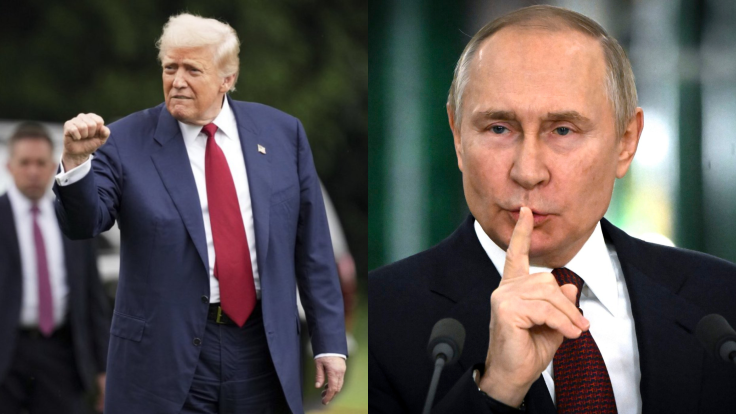Putin Unveils Sub That Can Unleash Radioactive Tsunami As Trump Orders Nuclear Tests: Report
Major US cities are said to be the potential targets of Russian warheads

Tensions between the United States and Russia have sharply escalated as Russian President Vladimir Putin unveiled a new nuclear-capable submarine, while US President Donald Trump has ordered the testing of American nuclear weapons. The announcements signal a dramatic increase in global risk, with experts warning of a potential conflict that could spiral into World War III.
The developments come amid decades of simmering hostility between the two nations. Russia's military expansion and the US response have raised fears of a catastrophic confrontation.
Officials warn that if other nuclear-armed allies join the conflict, including France, Britain, Pakistan, India, Israel, or North Korea, the consequences could be devastating. A full-scale clash could involve more than 12,000 warheads and threaten billions of lives worldwide.

Khabarovsk Submarine: Russia's New Weapon of Terror
Putin showcased the Khabarovsk submarine, which is equipped with Poseidon torpedoes capable of generating a radioactive tsunami along coastal areas. Military analysts say the move demonstrates Russia's intent to deter Western interference in its operations in Ukraine.
The Russian President, 73, has criticised Germany's plans to supply Ukraine with Taurus cruise missiles, describing them as a 'direct armed conflict' with Russia. NATO countries were also accused of being 'accomplices in these hostilities'.
Former President Dmitry Medvedev warned that delivering such missiles could end 'badly for everyone', highlighting the difficulty in distinguishing nuclear and conventional weapons in flight.
Retired US Army Major General Paul Vallely said that Russia could target Berlin if Ukraine deploys long-range missiles against strategic locations within Russia. 'Putin has nuclear weapons, and he's willing to use them', Vallely said. 'It's a doomsday scenario, and everyone in America should be worried.'
Russia reportedly maintains an arsenal of around 5,580 warheads, with several potentially aimed at major US cities including Washington, D.C., New York, Chicago, Houston, and Los Angeles.

Trump Responds: US Nuclear Tests Resume After 33 Years
In response to Russia's nuclear build-up, Trump has authorised tests of US nuclear weapons for the first time in 33 years.
Trump stated, 'Because of other countries' testing programs, I have instructed the Department of War to start testing our nuclear weapons on an equal basis. That process will begin immediately'. The US arsenal currently includes 5,225 warheads, while concerns remain about Russia's potential cooperation with China, which has approximately 600 nuclear weapons.
The announcement follows Russia's successful test of the Zircon hypersonic missile, which can reach speeds above Mach 9. The US countered by test-firing a nuclear-capable Minuteman III intercontinental ballistic missile from California, which landed successfully at the Ronald Reagan Ballistic Missile Defense Test Site in the Marshall Islands.

Trump's Possible Doomsday Defence Stategies
Reports indicate that Trump and his cabinet are preparing for worst-case scenarios by utilising secret bunkers, including facilities similar to the Pennsylvania's Raven Rock Mountain Complex from the movie 'A House of Dynamite'.
Top advisers, including Stephen Miller, Kristi Noem, Marco Rubio, Pete Hegseth, and Dan Driscoll, are said to have taken refuge in secure military installations.
Military experts suggest that strategic use of Air Force Global Strike Command could allow the US to neutralise Russian nuclear capabilities within 60 minutes.
Trump has also initiated the development of a $175 billion defence system known as the Golden Dome. The Pentagon describes it as capable of intercepting missiles launched from any location, including from space.
With both superpowers visibly strengthening their nuclear capabilities, the world faces a precarious moment in history. Analysts continue to warn that careful diplomacy and strategic restraint are crucial to avoiding a global catastrophe.
© Copyright IBTimes 2025. All rights reserved.





















